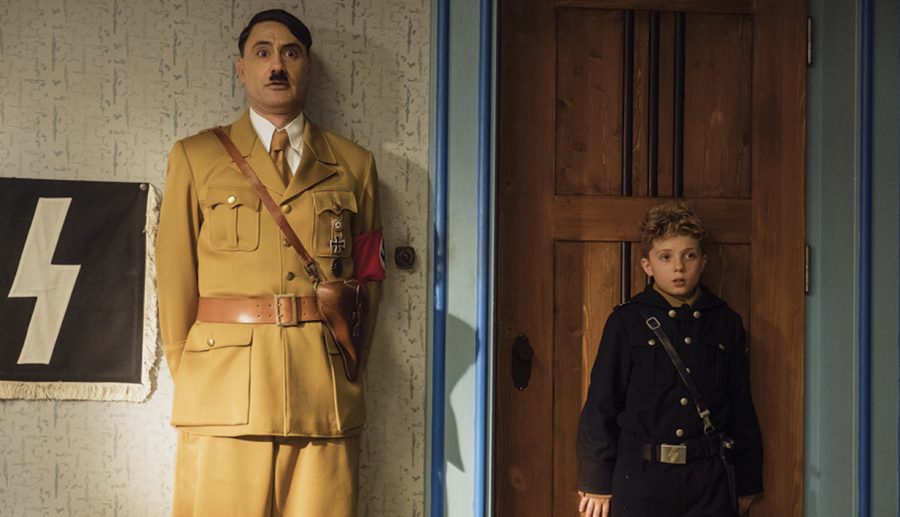Based on the novel “Caging Skies” by Christine Leunens, the film “Jojo Rabbit” won best adapted screenplay at this year’s Oscars and was nominated for best picture, best supporting actress (Scarlett Johansson), best production design, best costume design and best film editing. Taika Waititi, who directed, wrote the screenplay and played Hitler in the film, lets his signature style permeate through every minute of the hour and 48-minute runtime.
“Jojo Rabbit” is an irreverent satire with the palpable sense of playfulness that has defined Waititi’s popular creative works. This particular film follows a member of the Hitler Youth in 1940s Nazi Germany, which has caused many to ask the question, is Waititi’s style appropriate to cover such a heavy and in these times more than ever, topical subject? The film has garnered mixed critical acclaim, prominent reviewers arguing either that Waititi goes too far or that he balances his classic style well with more intense subject matter. Though Waititi certainly does not play it safe, Waititi uses his satire mindfully, bringing new meaning to the horrific impact of the Hitler regime that has not yet been explored in popular media.
The title character, Johannes (Jojo) Betzler (Roman Griffin Davis) is a ten year old member of the Hitler Youth and a self-proclaimed fanatic. He is obsessed with swastikas, gets in political arguments with his mother Rosie (Scarlett Johansson) and talks with his imaginary friend is Adolf Hitler, played by Waititi himself. The beginning of the film is very much the Nazi regime through a child’s eyes. Jojo attends a training weekend with the Hitler Youth. Here, Waititi’s dark sense of humor takes center stage. The children take “their first step to becoming men,” by learning about marching, bayonet drills, grenade-throwing, trench-digging, map-reading, gas defense, camouflage, ambush techniques, war games and firing guns.
The irony of watching children trained to be soldiers to the soundtrack of the Ramones’ “I Don’t Wanna Grow Up” is one of many examples of how Waititi uses satire to reveal deeper societal themes. In this case, Waititi uses the ridiculous image of children throwing grenades and doing jumping jacks in gas masks to highlight how absurd the glorification of war is. Though this scene is deeply funny, Waititi makes it clear that this problematic behavior cannot exist without consequence. The sequence comes to an abrupt end when Jojo accidentally blows himself up with a hand grenade in an attempt to prove himself to his peers.
The crux of this scene, absurdity but with gut wrenching consequences, is what allows Waititi to use humor as a tool to critique something as horrific as supremacism. As presented by Waititi, the Nazi ideology is ridiculous. The adults teach children that Jewish people have scales and hang from the ceiling like bats, children are given paper uniforms and are put on the front lines, Hitler screams about Jewish people “bossing your German brain around.” Despite the humor that is fraught throughout these situations in the movie, Waititi never allows the dire consequences of this kind of ignorance to be forgotten. Especially in the final thirty minutes, the ramifications of evil, however banal it appears throughout much of the film, very clearly demonstrates the horrific implications of this ideology.
Also, the film uses the relationship between Jojo, his mother and Elsa (Thomasin McKenzie), a Jewish girl that Rosie hides from the authorities, to demonstrate how love can absolve hate. Jojo’s character arc here is the most compelling part of the film. By begrudgingly developing a friendship with Elsa, Jojo begins to question his fanaticism and eventually disavows Hitler and Nazism all together. Furthermore, his connection with his mother Rosie throughout the film is vividly human and revealing. In addition to hiding a Jewish child in her home, Rosie is secretly a member of the resistance. Though she shows real love for her son, she prays that he will eventually come to his senses and become a kid again.
Throughout the film, shoes are used as a symbol of love and humanity. Rosie is constantly shown tying Jojo’s shoes as a demonstration of affection. Her identity is tied to her shoes in such a way that often there are shots of just her feet dancing, showing that life isn’t all about war and growing up. In the Jojo’s town square, people are hanged for going against the Nazi regime. Instead of showing their faces, Waititi only shows their shoes and legs.
This focus on shoes, love and identity is an homage to the shoes of holocaust victims. This is a common image when representing the holocaust, since sometimes it is difficult to bridge the gap between the shoes and their owners. This film pays special attention to humanizing this image which is put together in a gut wrenching way. This perfectly translates to the end of the movie, when Jojo bends down to tie Elsa’s shoes and the audience realizes that Jojo now sees through the Nazi propaganda. Through shoes, Waititi uses them to show that shoes are tied to the only thing that is able to overcome the senseless hate of the Nazi regime: love.
Sophia Larson can be reached at [email protected]



















